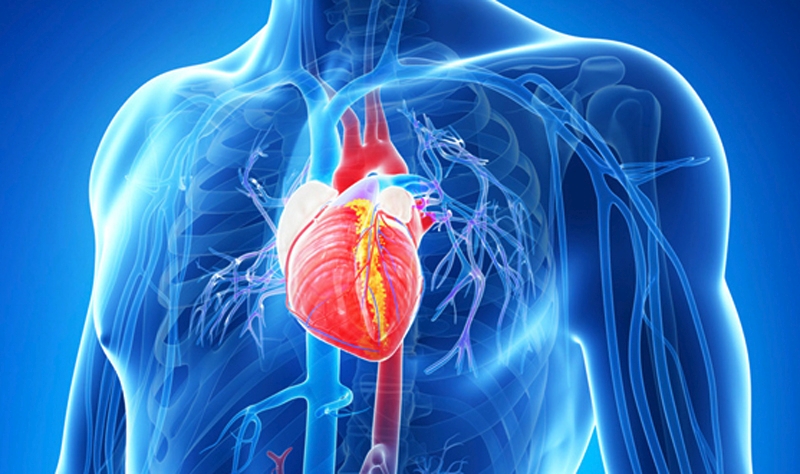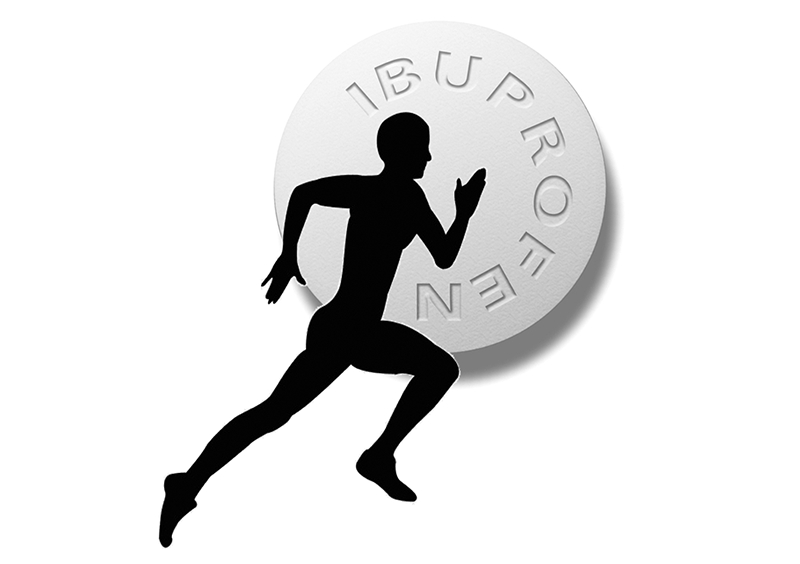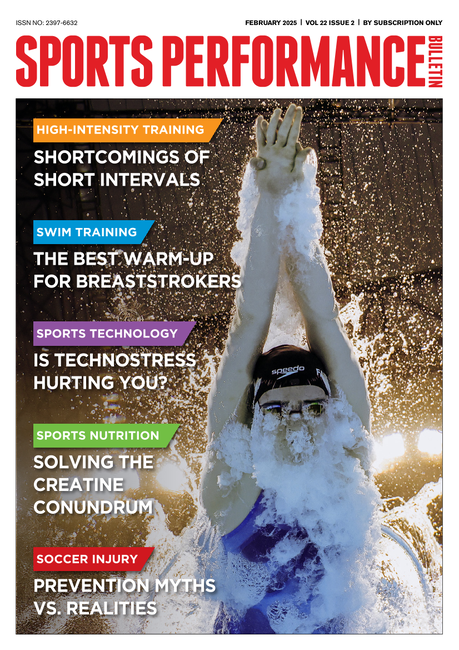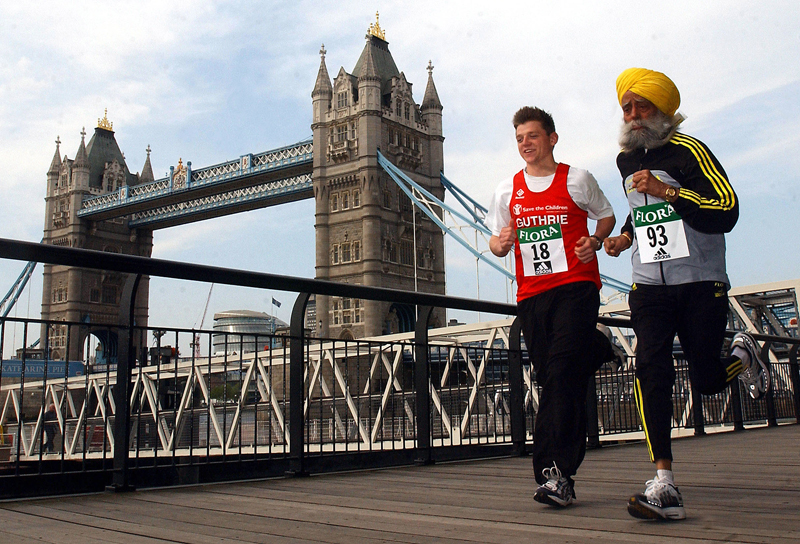You are viewing 1 of your 1 free articles. For unlimited access take a risk-free trial
Older athletes: why aspirin is your pre-race friend

Andrew Hamilton looks at new research suggesting the heart health of older endurance athletes may benefit from pre-race aspirin
A few years ago, I had the opportunity to chat with Dr Gary O’Donovan an eminent researcher in the field of exercise and health. One of the topics that came up was longevity and exercise habits. Dr O’Donovan’s research had clearly identified the health protective effects of regular vigorous exercise – not just in terms of heart health, but by reducing the risk of other early deaths too such as certain types of cancer. Indeed, his findings led him to believe that the riskiest lifestyle choice anyone can make in terms of shortening lifespan is to not engage in regular exercise! (NB – you can read more about Gary’s research and the health-protective effects of vigorous exercise in this Sports Performance Bulletin article)The conundrum of risk
The health benefits of exercise in terms of longevity are unarguable. However, as with all activities that bring benefits, there are risks too. And so it is with exercise, especially in middle-aged and older athletes. In simple terms, although exercise brings huge long-term health benefits, there can be a short-term risk of participating in vigorous exercise – namely cardiac arrest. This is particularly true for older athletes who take up sport later in life, where the physiological loading on a previously sedentary body can bring to the fore a hitherto hidden problem relating to cardiovascular health. As Dr O’Donovan explained: “If you want to maximise your chances of remaining alive for the next hour, stay in bed. If you want to maximise your chances of remaining alive for the next decade, get out there and start exercising!” This explains why age is a significant factor in pre-exercise risk assessment screening (to reduce the risk of an adverse cardiovascular event) by bodies such as the American College of Sports Medicine(1).The huge popularity boom in events such as cycling sportives, fun runs and marathon/half-marathon running is one area where long-term health aspirations and short-term health risk often collides. Deciding to ‘get fit’ for a marathon may well be when the physiology of a previously sedentary body is properly tested for the first time. These risks are likely to be higher during the actual race or event when the participant pushes himself/herself further and harder than during training. This risk is borne out by the data. While we know that endurance exercise such as marathon training is cardioprotective, we also know that since the year 2000, there’s been a 2.3-fold increase in the frequency of race-related cardiac arrests and sudden death in middle-aged men (40 and over)(2).
Protective measures with aspirin?
Exercise – no matter how late in life people take up the habit – is good for heart health and longevity in the long term. But the short-term risks of a life-threatening event such as heart attack, while low, cannot be ignored. This has led some researchers to speculate on whether older exercisers, especially those new to the habit, could benefit from some extra protection. In particular, there’s been a lot of interest in an everyday drug found at the pharmacy – aspirin.In recent years, research has indicated that the humble aspirin can provide health benefits way beyond tackling a hangover or combating cold symptoms. Not only is there strong evidence that regular aspirin use can reduce the risk of heart attacks and strokes in those at high risk, there’s also evidence that it could reduce the incidence of some cancers and even reduce the risk of developing Alzheimer’s disease. However, some newer research has suggested that aspirin specifically taken before exercise could be beneficial for older athletes participating in longer events such as cycle sportives and half or full marathons.
In a 2015 study that laid the groundwork for this approach, researchers reviewed all the previously published studies related to acute cardiac events such as stroke and heart attack during marathons(3). They came up with the following findings:
- *Male runners were more susceptible to a cardiac arrest than females.
- *Running a marathon was more risky than a half marathon.
- *There were 50 cardiac arrests in runners, 86% of whom were male with an average age of 42 years.
- *The main cause of sudden death in those over the age of 40 was atherosclerotic heart disease (where arteries become clogged up by fatty substances known as plaques or atheroma, which can eventually cut off the blood supply to areas of the heart causing a heart attack).
The most likely mechanism proposed by the researchers is that the physical stress during a long event such as a marathon can lead a clot to rupture from the wall of a larger artery and then find its way to a smaller, coronary artery, where a blockage (and heart attack) occurs. The researchers concluded therefore that the use of pre-race, low-dose aspirin therefore is recommended in older male runners; the temporary reduction in blood stickiness provided by aspirin is an effective way of reducing the risk of a clot-induced heart attack during a running event such as a marathon.
More support for aspirin use
Research shows that giving otherwise healthy middle-aged male low-dose aspirin on a daily basis reduces the risk of an acute cardiac event by 44%(4). With this in mind and the research above, the running guru Professor Tim Noakes and his colleagues presented a 2017 paper on this topic in which they argued strongly for the use of pre-race aspirin in older athletes(5). This was supported by the fact that the International Marathon Medical Directors Association (IMMDA) had already recommended pre-race aspirin for males over the age of 40 years – subject of course to the approval of a physician after considering the risks of aspirin such as gastrointestinal bleeding or allergy(6). In this paper, Professor Noakes also went onto explain that this strategy of aspirin use may also be relevant for habitual marathoners, who despite their healthy lifestyle, have higher than desirable levels of atherosclerotic plaque in the arteries, and where multiple races increases the overall risk of a transient cardiac event occurring.Another study published earlier this year looked at the use of cardiac computed tomography in endurance athletes with low conventional cardiac risk-factor profiles(7). In particular, the researchers measured the levels of calcium build up in the coronary arteries (in atherosclerotic plaques), and then compared calcium levels to see how closely this was correlated with a cardiac event risk. Their results showed that some of the athletes had scores of over 100 ‘Agatston units’, indicating a 10-year cardiac risk of 7.5% - ie just under a 1 in 14 chance of suffering a cardiac event during the next decade. This is considered the risk level at which additional measures for primary prevention are recommended, including aspirin. This implication of this research is that in future, it may be possible to develop a more targeted approach, which could help determine which athletes are most likely to benefit from pre-race aspiring supplementation.
Hard evidence?
The theory of pre-race aspirin to reduce the transient risk of a cardiac event is supported by solid medical evidence. But has it been actually tested in the field? To date, the answer is no. The difficulty is that the number of deaths occurring in otherwise healthy middle-aged athletes participating in distance events is (fortunately) statistically very small, which means we don’t have any data yet on the ratio of cardiac events in those taking pre-race aspirin vs. those not taking it. Of course, assuming the use of aspirin becomes more widespread, and gains wider support in the sports medicine community, it will be possible to assess precisely just how effective aspiring is in preventing cardiac events.Amby Burfoot: 1968 Boston Marathon champion, vet runner and advocate for pre-race aspirin use
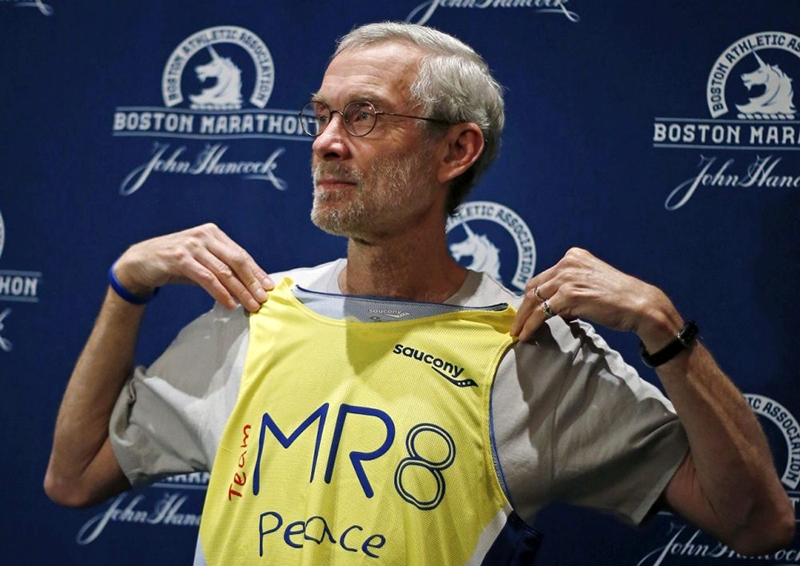
In the meantime though, the fundamentals of aspirin’s mode of action in the body, combined with solid evidence from large-scale studies on otherwise healthy middle-aged individuals makes it hard to argue against its use for one-off events such as marathons, sportives etc. While health professionals have cautioned against long-term indiscriminate aspirin use because of the risk of gastric bleeding, a one-off use of low-dose aspirin before a race carries little risk of any side effects, and is therefore recommended (but see below). As Amby Burfoot, the 1968 Boston Marathon champion, veteran runner and champion of aspirin put it, “Just because the cardiac risk of marathon running is low, it doesn’t mean it can’t be lower!”
Guidelines for aspirin use: when caution is required
The use of low dose (75-150mgs), one-off aspirin tablet before a race event is unlikely to cause any side effects in most people. However, those with a known allergy to aspirin, those with any clotting or bleeding disorders, or those on other medications such as anti-inflammatories such as NSAIDs should always consult with their physician before aspirin use.References
- Updating ACSM Recommendations for Exercise Pre-participation Health Screening Medicine & Science in Sports & Exercise 2015; 2473-9
- N Engl J Med 2012;366:130–40
- Open Heart. 2015 Jul 2;2(1):e000102
- N Engl J Med. 1989 Jul 20; 321(3):129-35
- Br J Sports Med. 2017 Nov; 51(22): 1579–1581
- Siegel AJ. IMMDA Advisory, 2015: pre-race aspirin to prevent heart attack and/or cardiac arrest during long distance running
- Am J Med. 2019 Feb;132(2):138-141
Newsletter Sign Up
Testimonials
Dr. Alexandra Fandetti-Robin, Back & Body Chiropractic
Elspeth Cowell MSCh DpodM SRCh HCPC reg
William Hunter, Nuffield Health
Newsletter Sign Up
Coaches Testimonials
Dr. Alexandra Fandetti-Robin, Back & Body Chiropractic
Elspeth Cowell MSCh DpodM SRCh HCPC reg
William Hunter, Nuffield Health
Keep up with latest sports science research and apply it to maximize performance
Today you have the chance to join a group of athletes, and sports coaches/trainers who all have something special in common...
They use the latest research to improve performance for themselves and their clients - both athletes and sports teams - with help from global specialists in the fields of sports science, sports medicine and sports psychology.
They do this by reading Sports Performance Bulletin, an easy-to-digest but serious-minded journal dedicated to high performance sports. SPB offers a wealth of information and insight into the latest research, in an easily-accessible and understood format, along with a wealth of practical recommendations.
*includes 3 coaching manuals
Get Inspired
All the latest techniques and approaches
Sports Performance Bulletin helps dedicated endurance athletes improve their performance. Sense-checking the latest sports science research, and sourcing evidence and case studies to support findings, Sports Performance Bulletin turns proven insights into easily digestible practical advice. Supporting athletes, coaches and professionals who wish to ensure their guidance and programmes are kept right up to date and based on credible science.
